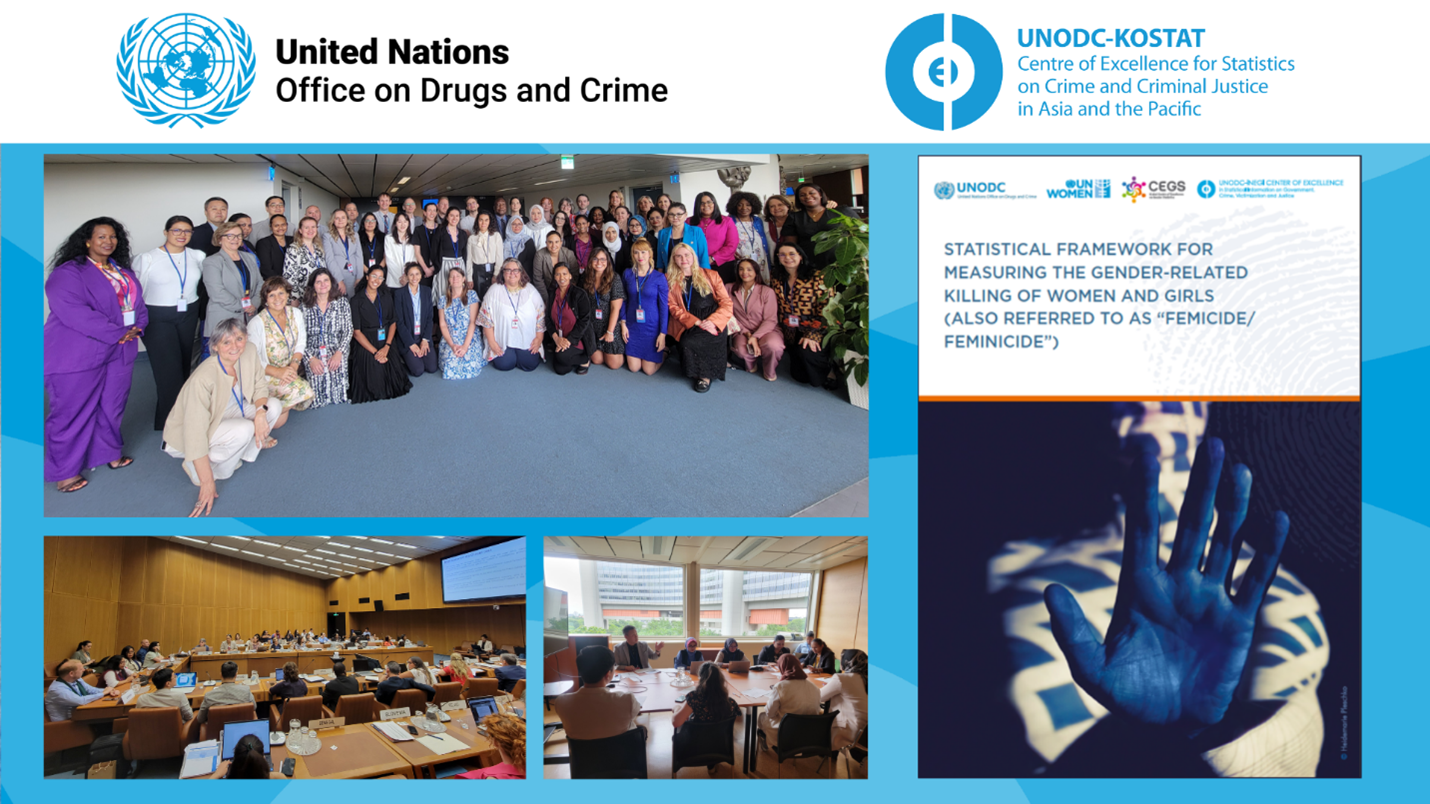
Vienna, Austria, 15–17 July 2025 – Despite growing international concern over the gender-related killing of women and girls, reliable statistical data remains scarce. Recognizing this gap, the United Nations Statistical Commission called for stronger national data systems on gender-based violence and tasked UNODC and UN Women with developing a statistical framework for gender-sensitive crime statistics, focusing on gender-related homicides. This work resulted in the Statistical Framework for Measuring the Gender-Related Killing of Women and Girls, released in 2021.
Since its launch, countries across the globe have begun implementing the framework, many with direct support from UNODC and UN Women. To take stock of progress, share lessons learned, and explore the next steps, UNODC and UN Women, together with the UNODC-KOSTAT Centre of Excellence (CoE), the UNODC-INEGI Center of Excellence, the UN Women Knowledge and Partnerships Centre, and the Global Centre of Excellence on Gender Statistics, hosted a global meeting in Vienna.
The event brought together experts and government representatives from all regions, with Asia and the Pacific strongly represented. Fiji and Mongolia shared their experiences as early adopters of the framework, supported by the CoE, while Indonesia, Pakistan, the Republic of Korea, and Thailand joined discussions on adapting and applying the framework in their national contexts. The exchanges underscored the region’s growing commitment to building robust, comparable data to better understand and prevent gender-related killings.
During the meeting, participants highlighted common challenges faced by countries in different regions, including difficulties aligning national definitions of femicide with the international framework and the limited availability of detailed data on the circumstances surrounding these crimes. Representatives emphasized the importance of inter-agency cooperation, linking statistical offices, justice systems, health sectors, and law enforcement to strengthen data collection and ensure accuracy. Fiji and Mongolia showcased their progress in implementing the framework, illustrating how integrated data systems and coordinated efforts can improve reporting and inform policies aimed at preventing femicide. Both countries also lack a statistical and legal definition of femicide, making it more difficult to standardize data collection across institutions.
Discussions also drew insights from other regions. The Dominican Republic stressed the need for stronger coordination between UNODC and the Economic Commission for Latin America and the Caribbean (ECLAC) to ensure coherent and high-quality data, as well as the importance of addressing resource constraints and legal recognition issues. Chile highlighted the challenges of interpreting complex statistical variables, such as “abduction,” and emphasized the value of ongoing technical support to ensure accurate and consistent application of the framework, provided to both countries by the UNODC-INEGI Center of Excellence.
Experts at the meeting also discussed innovative approaches to data collection, including the use of citizen-generated information and digital tools to enrich official statistics. The need for clear guidance on complex issues such as identifying gender motivation and collecting contextual variables was stressed to enhance the quality and comparability of femicide data.
Despite challenges such as limited resources and legal recognition in some countries, the meeting reaffirmed a global commitment to improving femicide statistics as a crucial step towards better understanding and ultimately preventing gender-related violence. UNODC and UN Women pledged to continue supporting countries through training, technical assistance, and the development of practical tools, ensuring that data systems are sustainable and responsive to national needs.
As a result of this collaborative effort, the next phase will focus on finalizing implementation guidelines and expanding regional cooperation to strengthen data systems. The outcomes will contribute to global reporting efforts and help shape policies to protect women and girls from violence across Asia and the Pacific, and beyond. All meeting materials, including the full agenda and presentations, are available here.
Further information on the CoE can be found here, X @CoE_UNODC and Facebook @UNODC.KOSTAT.CoE.